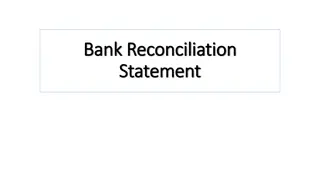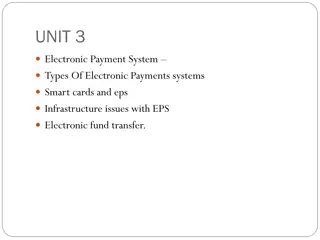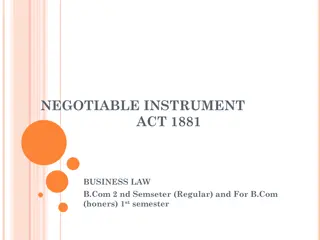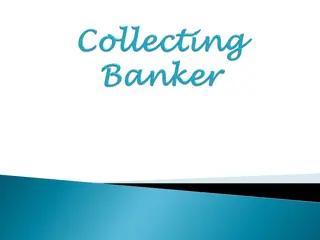Understanding the Negotiable Instruments Act, 1881: Types of Instruments and Holders
The Negotiable Instruments Act, 1881 was enacted to provide legal recognition to credit instruments easily transferable as money. It defines negotiable instruments like promissory notes, bills of exchange, and cheques, including local usages. Instruments can be negotiated multiple times until maturi
0 views • 25 slides
Understanding Cheques in Commerce and Banking
Explore the world of cheques in commerce with lectures by Dr. Kaynat Tawar on relevant topics such as cheque types, crossing, definitions, and characteristics. Learn about the meaning of cheques, their importance, and how they serve as a safe and convenient payment method in the financial world.
0 views • 29 slides
Understanding Bank Reconciliation Statements
Bank Reconciliation Statements are essential for reconciling differences between bank statement balances and accounting records. This process involves analyzing various transactions such as issued cheques, deposits, bank charges, and more. Check out examples and detailed explanations in this informa
0 views • 31 slides
Overview of Cheques in Indian Banking System
Learn about different types of cheques in the Indian banking system including bearer cheques, order cheques, crossed cheques, and account payee cheques. Understand the characteristics and usage of each type of cheque to facilitate secure and efficient financial transactions.
1 views • 11 slides
Evolution of Electronic Payment Systems: From Barter to Cryptocurrencies
The evolution of payment systems has come a long way, from the barter system in ancient times to the modern era of cryptocurrencies and digital payments. This journey includes the invention of coins, paper money, banknotes, cheques, credit cards, and the latest digital payment methods. The impact of
0 views • 24 slides
Understanding the Negotiable Instrument Act of 1881 in Business Law for B.Com Students
The Negotiable Instrument Act of 1881 governs the transferable nature of negotiable instruments like promissory notes, bills of exchange, and cheques. These instruments are freely transferable, created for consideration, and must have certain essential elements. The act provides rules for acceptance
0 views • 22 slides
Understanding the Role of Collecting Bankers in Cheque Collection Process
Collecting bankers play a crucial role in collecting cheques and bills on behalf of customers. They act as agents, scrutinize instruments, check endorsements, present instruments on time, and collect proceeds in the payee's account. They also handle notice of dishonor and return instruments if neede
0 views • 10 slides
C.U.S. Hamper Fund - Supporting Dublin Communities for Many Years
The C.U.S. Hamper Fund has been ongoing for many years, with a commitment from students to provide hampers, food vouchers, and cheques to poor communities around Dublin City. The initiative benefits various Dublin communities, schools, and organizations such as St. Enda's, homeless shelters, and bre
0 views • 7 slides







